Abstract
Experiences of illness and death, as well as beliefs about the appropriate role of healers, are profoundly influenced by patients' cultural background. As the United States becomes increasingly diverse, cultural difference is a central feature of many clinical interactions. Knowledge about how patients experience and express pain, maintain hope in the face of a poor prognosis, and respond to grief and loss will aid health care professionals. Many patients' or families' beliefs about appropriate end-of-life care are easily accommodated in routine clinical practice. Desires about the care of the body after death, for example, generally do not threaten deeply held values of medical science. Because expected deaths are increasingly the result of explicit negotiation about limiting or discontinuing therapies, however, the likelihood of serious moral disputes and overt conflict increases. We suggest a way to assess cultural variation in end-of-life care, arguing that culture is only meaningful when interpreted in the context of a patient's unique history, family constellation, and socioeconomic status. Efforts to use racial or ethnic background as simplistic, straightforward predictors of beliefs or behavior will lead to harmful stereotyping of patients and culturally insensitive care for the dying.
Full text
PDF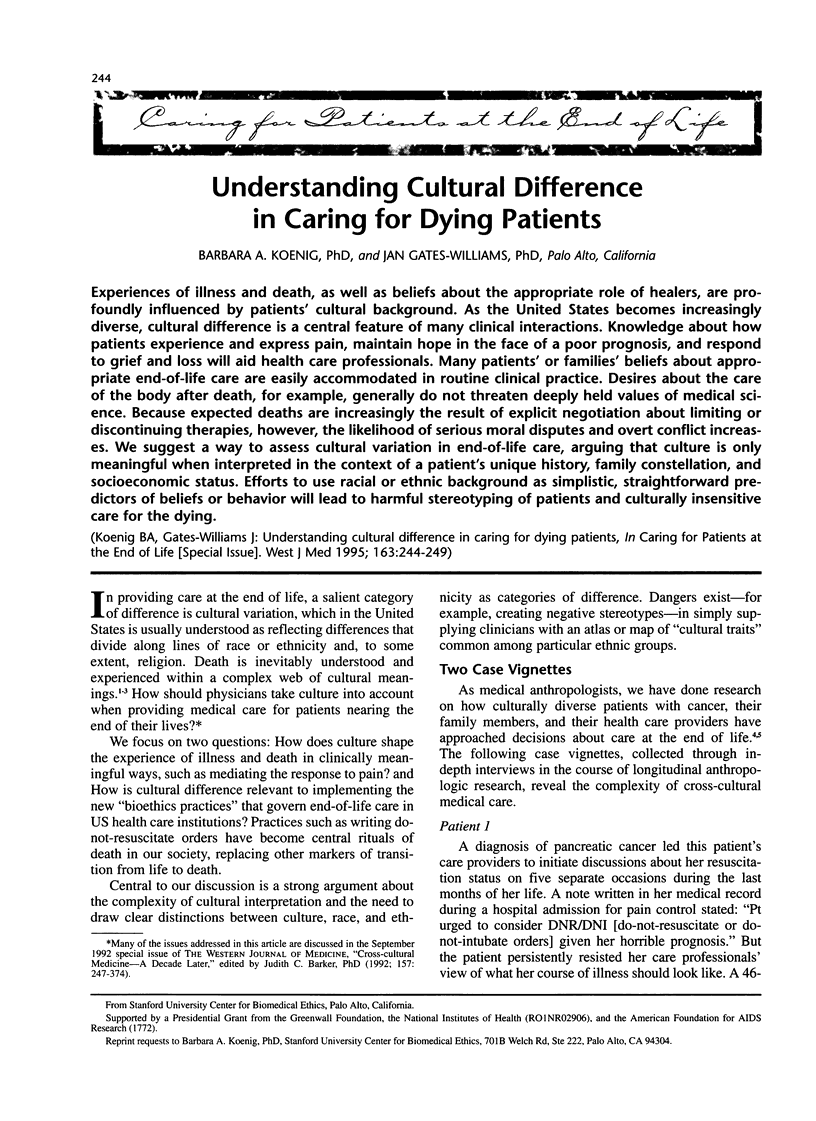
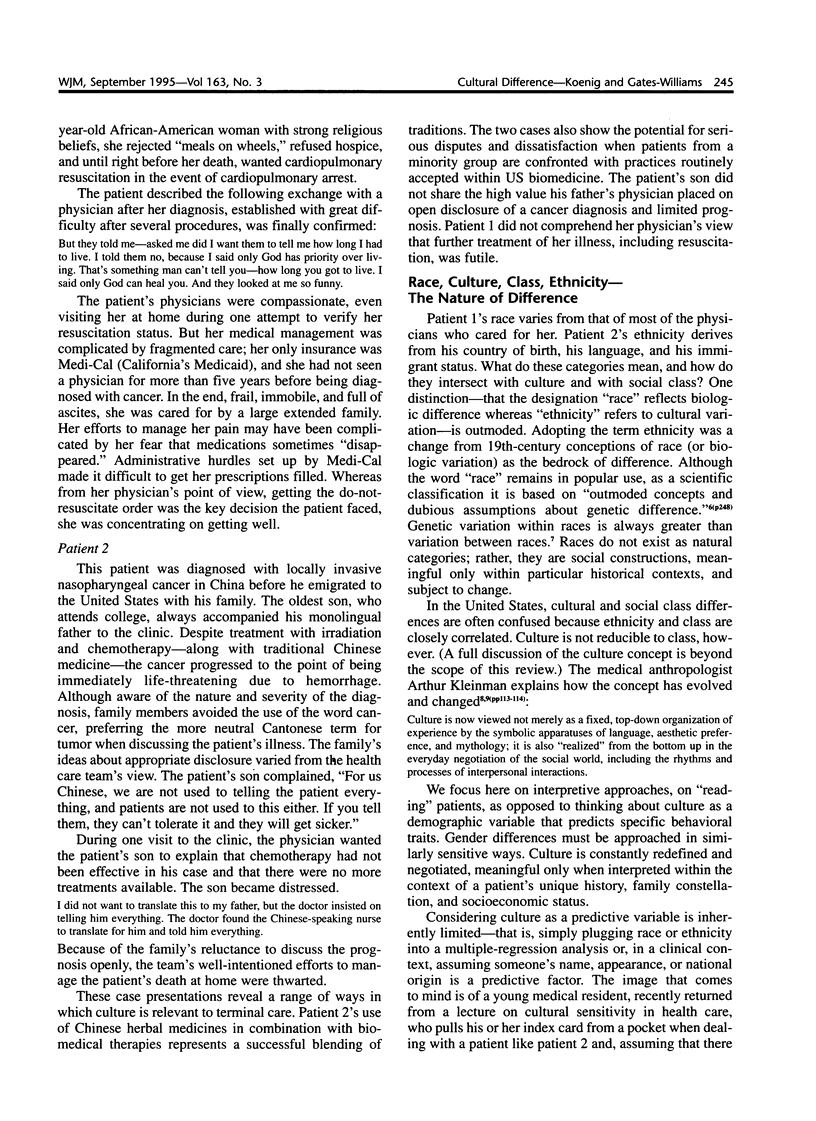
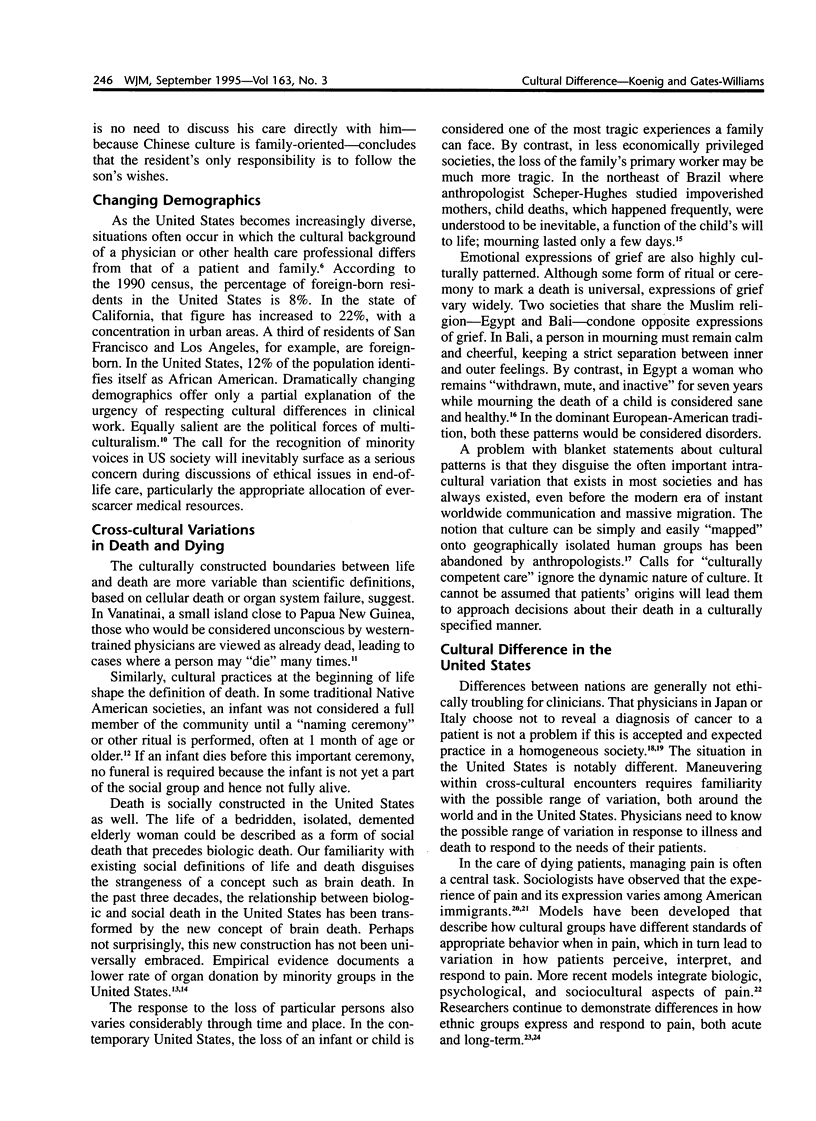
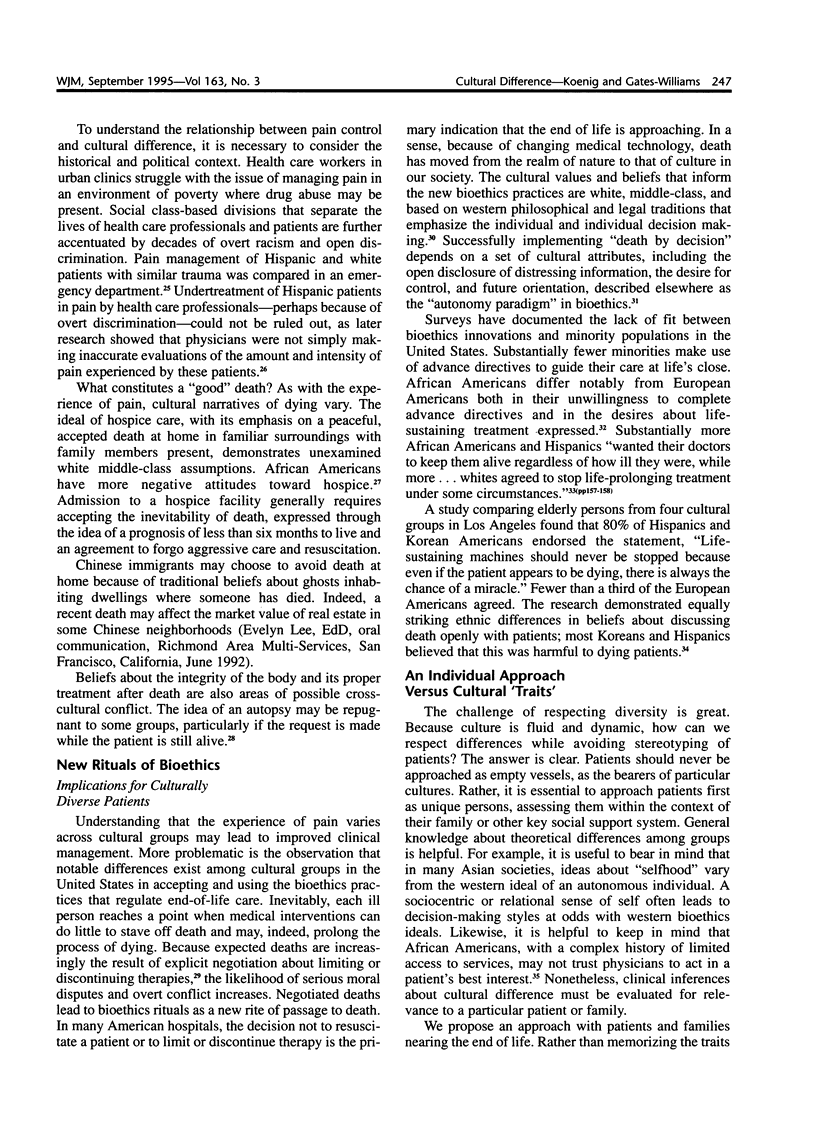
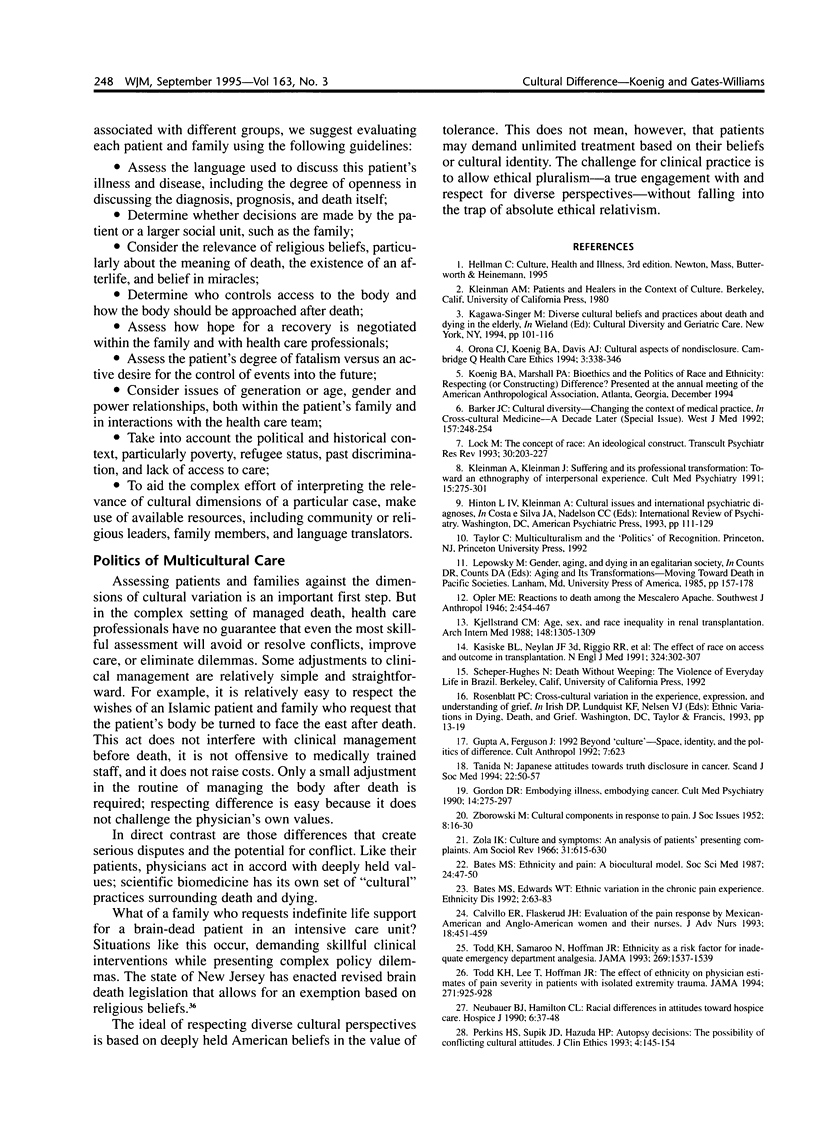
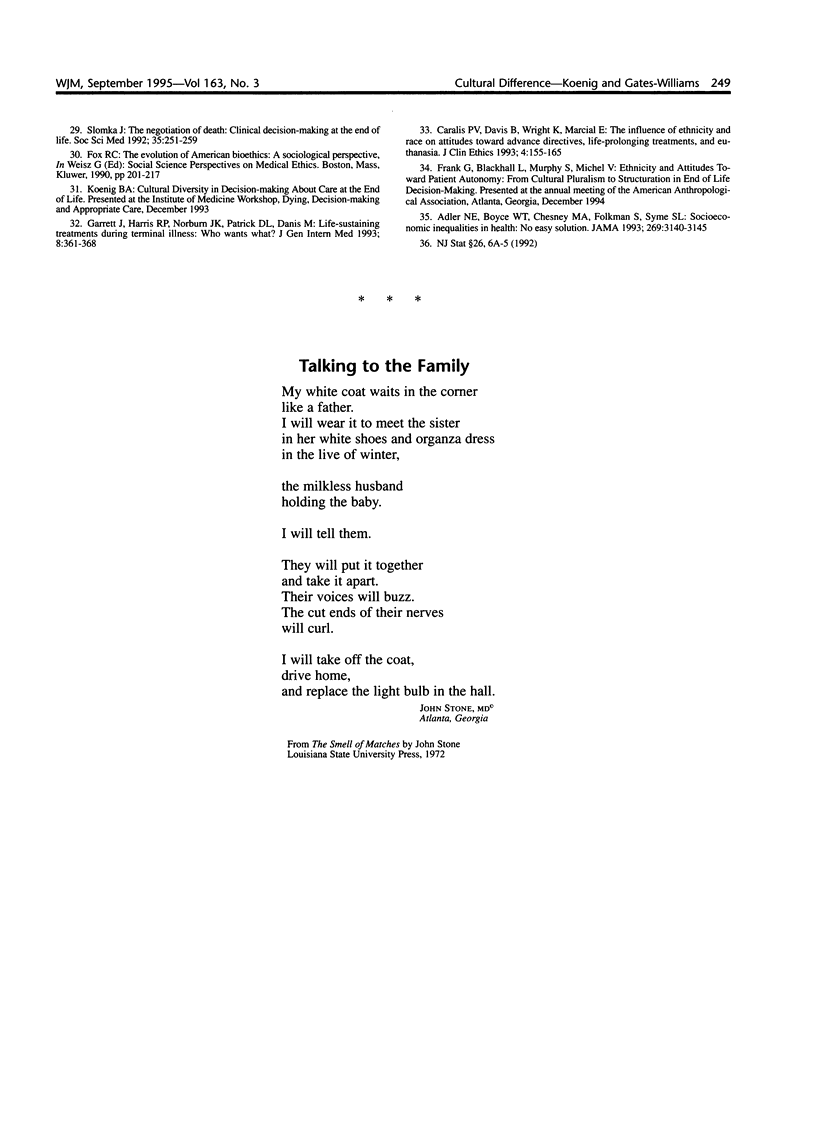
Selected References
These references are in PubMed. This may not be the complete list of references from this article.
- Adler N. E., Boyce W. T., Chesney M. A., Folkman S., Syme S. L. Socioeconomic inequalities in health. No easy solution. JAMA. 1993 Jun 23;269(24):3140–3145. [PubMed] [Google Scholar]
- Barker J. C. Cultural diversity--changing the context of medical practice. West J Med. 1992 Sep;157(3):248–254. [PMC free article] [PubMed] [Google Scholar]
- Bates M. S., Edwards W. T. Ethnic variations in the chronic pain experience. Ethn Dis. 1992 Winter;2(1):63–83. [PubMed] [Google Scholar]
- Bates M. S. Ethnicity and pain: a biocultural model. Soc Sci Med. 1987;24(1):47–50. doi: 10.1016/0277-9536(87)90138-9. [DOI] [PubMed] [Google Scholar]
- Calvillo E. R., Flaskerud J. H. Evaluation of the pain response by Mexican American and Anglo American women and their nurses. J Adv Nurs. 1993 Mar;18(3):451–459. doi: 10.1046/j.1365-2648.1993.18030451.x. [DOI] [PubMed] [Google Scholar]
- Caralis P. V., Davis B., Wright K., Marcial E. The influence of ethnicity and race on attitudes toward advance directives, life-prolonging treatments, and euthanasia. J Clin Ethics. 1993 Summer;4(2):155–165. [PubMed] [Google Scholar]
- Garrett J. M., Harris R. P., Norburn J. K., Patrick D. L., Danis M. Life-sustaining treatments during terminal illness: who wants what? J Gen Intern Med. 1993 Jul;8(7):361–368. doi: 10.1007/BF02600073. [DOI] [PubMed] [Google Scholar]
- Gordon D. R. Embodying illness, embodying cancer. Cult Med Psychiatry. 1990 Jun;14(2):275–297. doi: 10.1007/BF00046665. [DOI] [PubMed] [Google Scholar]
- Kasiske B. L., Neylan J. F., 3rd, Riggio R. R., Danovitch G. M., Kahana L., Alexander S. R., White M. G. The effect of race on access and outcome in transplantation. N Engl J Med. 1991 Jan 31;324(5):302–307. doi: 10.1056/NEJM199101313240505. [DOI] [PubMed] [Google Scholar]
- Kjellstrand C. M. Age, sex, and race inequality in renal transplantation. Arch Intern Med. 1988 Jun;148(6):1305–1309. [PubMed] [Google Scholar]
- Kleinman A., Kleinman J. Suffering and its professional transformation: toward an ethnography of interpersonal experience. Cult Med Psychiatry. 1991 Sep;15(3):275–301. doi: 10.1007/BF00046540. [DOI] [PubMed] [Google Scholar]
- Neubauer B. J., Hamilton C. L. Racial differences in attitudes toward hospice care. Hosp J. 1990;6(1):37–48. doi: 10.1080/0742-969x.1990.11882664. [DOI] [PubMed] [Google Scholar]
- Orona C. J., Koenig B. A., Davis A. J. Cultural aspects of nondisclosure. Camb Q Healthc Ethics. 1994 Summer;3(3):338–346. doi: 10.1017/s0963180100005156. [DOI] [PubMed] [Google Scholar]
- Perkins H. S., Supik J. D., Hazuda H. P. Autopsy decisions: the possibility of conflicting cultural attitudes. J Clin Ethics. 1993 Summer;4(2):145–154. [PubMed] [Google Scholar]
- Slomka J. The negotiation of death: clinical decision making at the end of life. Soc Sci Med. 1992 Aug;35(3):251–259. doi: 10.1016/0277-9536(92)90021-h. [DOI] [PubMed] [Google Scholar]
- Tanida N. Japanese attitudes towards truth disclosure in cancer. Scand J Soc Med. 1994 Mar;22(1):50–57. doi: 10.1177/140349489402200109. [DOI] [PubMed] [Google Scholar]
- Todd K. H., Lee T., Hoffman J. R. The effect of ethnicity on physician estimates of pain severity in patients with isolated extremity trauma. JAMA. 1994 Mar 23;271(12):925–928. [PubMed] [Google Scholar]
- Todd K. H., Samaroo N., Hoffman J. R. Ethnicity as a risk factor for inadequate emergency department analgesia. JAMA. 1993 Mar 24;269(12):1537–1539. [PubMed] [Google Scholar]
- Zola I. K. Culture and symptoms--an analysis of patients' presenting complaints. Am Sociol Rev. 1966 Oct;31(5):615–630. [PubMed] [Google Scholar]


